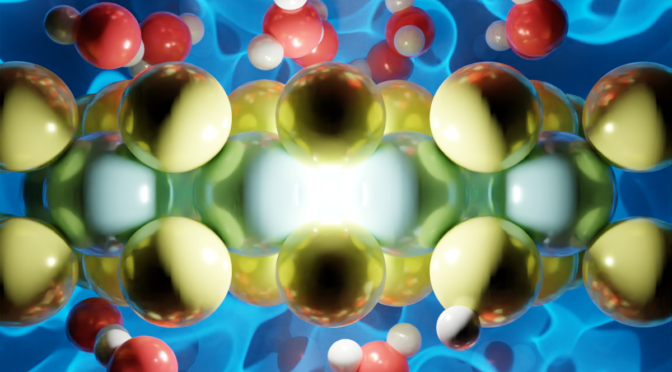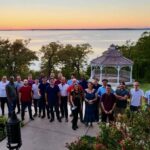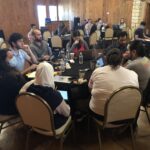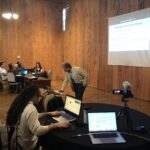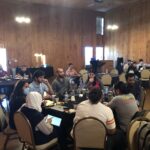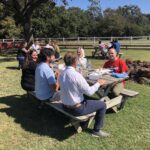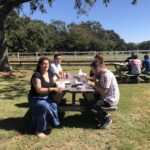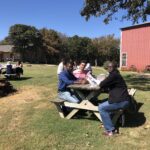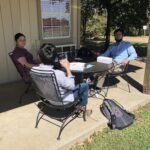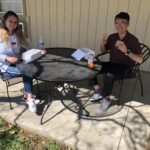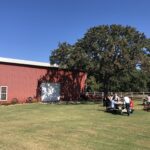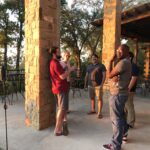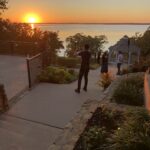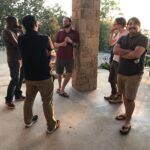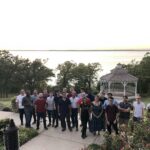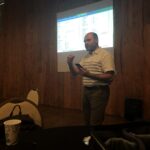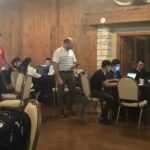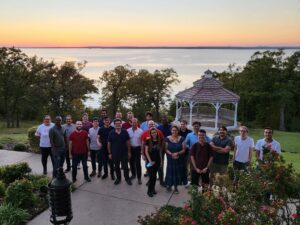
From the 11th to the 13th of October 2021 the first school on multiscale models in Quantum Espresso was held in Texas, at the Lone Star Lodge and Marina, near Pilot Point. The school welcomed 22 in person participants, with 7 instructors from 3 US institutions. More than half of the in-person participants belong to groups that are under-represented in computational physics. While the initial plan for the school was to be in person-only, due to the pandemic situation in Texas and the rules that hindered international travelers to enter the US, the school was converted into a hybrid event. More than 450 participants registered to join the school remotely, with more than 100 participants joining specific Zoom lectures. Details on the country of origin and seniority of the registered participants are summarized in the figure below.
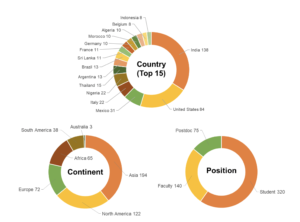
All the lectures were recorded and posted on the school website, accessible at any time for registered and non-registered participants. The school was sponsored by Psi-k and the National Science Foundation (CSSI and CHE programs) under awards #1931479 and #1945139.
The school aim was to introduce the use of a set of tools build around the Quantum Espresso package for simulations of condensed matter and materials. In particular the school goals were:
- Modeling materials with Quantum ESPRESSO
- Characterize materials properties with PAOFLOW
- Introduce solvent and electrolyte effects with Environ
- Tackle complexity and large scales with QEpy and eDFTpy
The school featured a combination of lectures on the theory and models behind the tools, hands-on tutorials on using the tools, and research presentations from 3 invited speakers. Each hands-on tutorial included a specific challenge for the students, and 5 students were awarded a prize for their engagement and active participation.
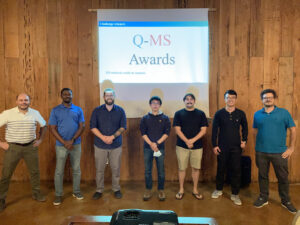
The school exploited a virtual machine based on Ubuntu 18.04.LTS, with all the required tools pre-installed. The school tutorials were designed using public GitHub repositories. GitHub Classroom (Quantum-Multiscale-2021) was used to allow each student to have their individual copy of the school assignments. The chosen setup allows for re-use of the material for future events. Moreover, the material is constantly updated and accessible to the students, with the possibility to have instructor feedbacks at any time. The following five tutorials were created and distributed to the students through the Quantum-Multiscale-Template GitHub organization
- QE-Tutorials
- PAOFLOW-Tutorials
- Environ-Tutorials
- QEpy-Tutorials
- eDFTpy-Tutorials
In total, 456 tutorial repositories were created by students, with the last one updated on November 15 2021.
All the school material, including the slides of the presentations and the links to the GitHub Classroom assignments are accessible on the school website: http://www.quantum-multiscale.org/school-materials.html.
The Q-MS School 2021 was delivered in a hybrid format, with both in person and remote (Zoom) participants. The zoom recordings of all lectures and tutorials can be found in the following links:
Monday
- Lecture 1: Fundamentals of Density Functional Theory (D. Donadio)
- Tutorial 1: Simulations with Quantum Espresso (D. Donadio)
- Seminar 1: Light-Matter Interactions in Aqueous Systems: Insights from Molecular Modeling (D. Donadio)
- Lecture 2: Post-Processing for Materials Properties (M. Buongiorno Nardelli)
- Tutorial 2: Advanced QE Simulations and PAOFLOW (M. Buongiorno Nardelli)
Tuesday
- Lecture 3: Continuum Models of Solvation (O. Andreussi)
- Tutorial 3: Simulations with Environ (O. Andreussi)
- Seminar 2: A quantum multiscale modeling of light-induced biological function: dream or reality? (B. Mennucci)
- Lecture/Tutorial 4: Environ for Spectra (F. Bononi)
- Lecture/Tutorial 4: Electrified Interfaces (O. Andreussi)
Wednesday
- Lecture 5: Quantum Embedding Electronic Structure Methods (M. Pavanello)
- Tutorial 5: Basic Workflows with QE in Python: QEpy (M. Pavanello)
- Seminar 3: Composite Methods, Fragmentation and Embedding (L. Visscher)
- Lecture/Tutorial 6: Embedding in Quantum ESPRESSO (M. Pavanello)
Lecturers
The lectures and hands-on tutorials were designed and delivered by (in alphabetical order):
- Oliviero Andreussi, UNT, Texas, USA
- Edan Bainglass, UNT, Texas, USA
- Fernanda Bononi, UNT, Texas, USA
- Marco Buongiorno Nardelli, UNT, Texas, USA
- Davide Donadio, UC Davis, California, USA
- Alessandro Genova, Kitware Inc., New York, USA
- Michele Pavanello, Rutgers Newark, New Jersey, USA
The following speakers were invited to deliver research presentations on topics connected to first-principles based multiscale simulations:
- Davide Donadio, UC Davis, California, USA
- Benedetta Mennucci, University of Pisa, Italy (remote delivery)
- Lucas Visscher, VU University of Amsterdam, Netherlands (remote delivery)
Organizers
The school organizers were:
- Oliviero Andreussi, UNT, Texas, USA
- Michele Pavanello, Rutgers Newark, New Jersey, USA
Further Details
Event website, with program and school material
Full program, with abstracts and presentations
Photos

